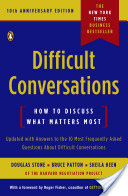 Judith’s Book review, by Stone, D., Patton, B., Heen, S. (1999) Difficult Conversations – How to discuss what matters most Penguin Books
Judith’s Book review, by Stone, D., Patton, B., Heen, S. (1999) Difficult Conversations – How to discuss what matters most Penguin Books
This softcover book has 250 pages, drawing on research from organizational behaviour, cognitive client-centred and family therapies; social psychology; communication theory and ‘dialogue.’ Authors provide examples from couples, colleagues, boss and contractor. We need more than tact when the news is not good. Authors offer examples of LEARNING CONVERSATIONS
Why this resource might be helpful is to help clients approach those difficult conversations with former bosses, colleagues or significant others. We all need to learn how to improve team building skills and political savvy when not able to get resolution.
When we address a problem, we need to sort out the conversations –yours, mine and the 3rd story. A teaching tool to help us explore others’ stories, untie intent from impact and assess one’s contribution vs blaming the other. The authors provide a roadmap how to have those difficult conversations:
What happened?
| Multiple stories | Impact/intent | Contribution | feelings | Identity Issues |
| What’s my story?What’s her story? | My intentImpact on me
Her intent
Impact on her
|
What did I contribute to the problemWhat did she contribute to the problem
|
What feelings underlie my attributions, judgments | How does what happened threaten my identity? |
| Check your purpose whether to raise the issue | What do you hope to accomplish by having this conversation? – | shift to support learning, sharing and problem solving | If you don’t raise it, what can you do to let it go? | |
| Start from the THIRD story | Describe the problem as the DIFFERENCE between the 2 stories | Share your purposes | Invite other to join as partner in sorting out the situation together | |
| Explore their story and your story | Listen to understand their perspective on what happened. Acknowledge feelings, paraphrase, | Share your viewpoint (past experiences, intentions, feelings | Reframe to keep on track. From truth to perceptions, from blame to contribution, from accusations to feelings | |
| Problem Solving | Invent options that meet each side’s most important concerns | Look to standards for what SHOULD happen, considering mutual caretaking relationships | Talk about how to keep communications open |
An easy read, great techniques and strategies when one is burdened with a difficult message to impart.
I’ll bring to our next meeting for your team
